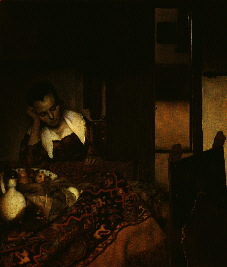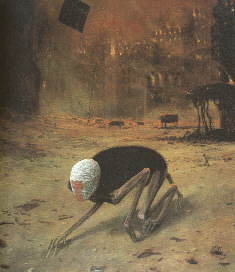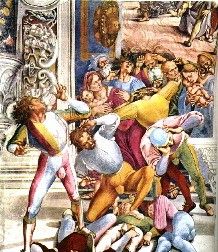

The Moralist and the Philosopher
Short-story writer and philosopher Milosz’s poetry brings also thoughts of philosophical and moral character. Put in the foreground one can find the problem of the disintegration of the Universe based on religion, constant search for God and peace and inner order
MAGPIETY (King Popiel and Others
Poems)
The same and not quite the same, I walked
through oak forests
Amazed that my Muse, Mnemosyne,
Has in no way
diminished my amazement.
A magpie was screeching and I said:
Magpiety?
What is magpiety? I shall never achieve
A magpie heart, a hairy
nostril over the beak, a flight
That always renews just when coming
down,
And so I shall never comprehend magpiety.
If however magpiety does
not exist
My nature does not exist either.
Who would have guessed that,
centuries later,
I would invent the dispute of universals?
Montgeran,
1958
translated by Czeslaw Milosz and Peter Dale
Scott
I SLEEP A LOT (Bobo's
Metamorphosis)
I sleep a lot and read St. Thomas
Aquinas
Or The Death of God (that's a Protestant book).
To the right the
bay as if molten tin,
Beyond the bay, city, beyond the city, ocean,
Beyond
the ocean, ocean, till Japan.
To the left dry hills with white
grass,
Beyond the hills an irrigated valley where rice is grown,
Beyond
the valley, mountains and Ponderosa pines,
Beyond the mountains, desert and
sheep.
When I couldn't do
without alcohol, I drove myself on alcohol,
When I couldn't do without
cigarettes and coffee, I drove myself
On cigarettes and coffee.
I was
courageous. Industrious. Nearly a model of virtue.
But that is good for
nothing.
I feel a pain.
not here. Even I don't know.
many islands
and continents,
words, bazaars, wooden flutes,
Or too much drinking to the
mirror, without beauty,
Though one was to be a kind of archangel
Or a
Saint George, over there, on St. George Street.
Please, Doctor,
Not here.
No,
Maybe it's too
Unpronounced
Please, Medicine Man, I feel a
pain.
I always believed in spells and incantations.
Sure, women have only
one, Catholic, soul,
But we have two. When you start to dance
You visit
remote pueblos in your sleep
And even lands you have never seen.
Put on, I
beg you, charms made of feathers,
Now it's time to help one of your own.
I
have read many books but I don't believe them.
When it hurts we return to the
banks of certain rivers.
I remember those crosses with chiseled suns and
moons
And wizards, how they worked during an outbreak of typhus.
Send your
second soul beyond the mountains, beyond time.
Tell me what you saw, I will
wait.
Berkeley, 1962
translated by Czeslaw
Milosz
The lyrical subject shows the affirmative attitude to the world. For him the paradise is the garden where he can work and feel worthy. Birds and flowers supplement this beauty. As far as the message of the poem is concerned, it can be placed in classicism; aesthetic defines ethics, that is why the outer beauty softens the wish of possessing, envy, jealous memory, excessive demands from oneself, pain. Mood of the poem "An Hour" is similar.
AN HOUR (From The Rising of the Sun)
Leaves glowing in the sun, zealous hum of
bumblebees,
From afar, from somewhere beyond the river, echoes of lingering
voices
And the unhurried sounds of a hammer gave joy not only to
me.
Before the five senses were opened, and earlier than any
beginning
They waited, ready, for all those wh6 would call themselves
mortals,
So that they might praise, as I do, life, that is,
happiness.
Berkeley, 1972
translated by Gzeslaw Milosz
and Lillian
Vallec
Not all the text of this thematic circle are cheerful. There is the poem „Oeconomia divina”
OECONOMIA DIVINA (From The Rising of the Sun)
I did not expect to live in such an unusual moment.
When the God of thunders and of
rocky heights,
The Lord of hosts, Kyrios Sabaoth,
Would humble people to
the quick,
Allowing them to act whatever way they wished,
Leaving to them
conclusions, saying nothing.
It was a spectacle that was indeed unlike
The
agelong cycle of royal tragedies.
Roads on concrete pillars, cities of glass
and cast iron,
Airfields larger than tribal dominions
Suddenly ran short
of their essence and disintegrated
Not in a dream but really, for, subtracted
from themselves,
They could only hold on as do things which should not
last.
Out of trees, field stones, even lemons on the table,
Materiality
escaped and their spectrum
Proved to be a void, a haze on a
film.
Dispossessed of its objects, space was swarming.
Everywhere was
nowhere and nowhere, everywhere.
Letters in books turned silver-pale,
wobbled, and faded
The hand was not able to trace the palm sign, the river
sign, or the sign of ibis.
A hullabaloo of many tongues proclaimed the
mortality of the language.
A complaint was forbidden as it complained to
itself.
People, afflicted with an incomprehensible distress,
Were throwing
off their clothes on the piazzas so that nakedness might call
For
judgment.
But in vain they were longing after horror, pity, and
anger.
Neither work nor leisure
Was justified,
Nor the face, nor the
hair nor the loins
Nor any existence.
Berkeley, 1973
translated by Caeslaw Milosz
In this poem Milosz appears as a great moralist. The text is called „The Apocalipse stopped in time”, the picture of the world which fades the absolute because he „allowed people to act whatever way they wished”; he left them to themselves. This way the world was deprived of the sacrum and because of it the world is getting scattered. Everything is deteriorating, culture has no values, the volumes of the Bible are out of date, words are no longer able to describe. Man in such a situation lost his hope, took off his gown „so that nakedness might call for judgement” Nakedness-this is a culture sign-in medieval iconography of the Last Judgement the figures are naked. This nakedness may mean either return to primal instincts or the process of getting rid of the individuality. The message of the text; respecting God’s rules may protect against chaos, but if people turn their backs on them, everything loses its sense and this sense may only come from sacrum. Man has to have something sacred, a kind of moral support, has to respect the rules, otherwise being absolutely free - will reap chaos.
Very interesting text is the poem „Meaning” writen in 1988.
MEANING (Provinces)
- When I die, I Will see the lining of the world.
The other side, beyond bird,
mountain, sunset.
The true meaning, ready to be decoded.
What never added
up will add Up,
What was incomprehensible will be comprehended.
- And if
there is no lining to the world?
If a thrush on a branch is not a
sign,
But just a thrush on the branch? If night and day
Make no sense
following each other?
And on this earth there is nothing except this
earth?
- Even if that is so, there will remain
A word wakened by lips that
perish,
A tireless messenger who runs and runs
Through interstellar
fields, through the revolving galaxies,
And calls out, protests,
screams.
Berkeley, 1988
translated by Czealaw Milosz
and Robert Hasa
Here appears the question asked by every person man what happens after death? Does higher Sense exist ? What is the secret of existence ? The lyrical subject assumes that there are two possibilities - they are expressed in metaphorical way. The first of them: the after - life does exist („I will see the lining of the world”) The other one: the after - life does not exist („And if there is no lining to the world?” „If night and day make no sense following each other?” And on this earth there is nothing except this earth? But there is one thing that may be the defense against the sadness of passing away and temporariness - poetry. It exists because existential questions exist and are asked on and on. Word - impermanent (precarious, unstable) - will outlive the person who uttered it; the spirit is stronger than the matter. The reader does not receive one definite answer, doubt remains. This fade of the dots over the „i”, multiplying doubts is characteristic for Milosz’s poetry.
This page, in its earlier 1997 version (use right mouse to open in new window), was created by Aleksandra Kolodziejczyk, Iwona Kowalska, and Dariusz Plygawko, students of the Fifth General Education Liceum in Bielsko-Biala. Marcin Tomana and Piotr Kowalski of the School's Informatics faculty and Urszula Zajaczek of the Polish Language faculty, acted as advisors. Linguistic editing of current version by Peter K. Gessner.
| Info-Poland a clearinghouse of information about Poland, Polish Universities, Polish Studies, etc. |